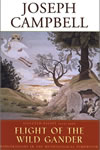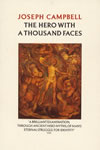Published in 1949, The Hero With a Thousand Faces brought Campbell international fame. The book shows common threads that run through the world’s mythology. In his exploration, Campbell outlined a psychological blueprint that is relevant to all people at all times.
As with any great teacher, Campbell’s enthusiasm carries the reader along. There is nothing dry or dusty in his scholarship. His themes are fascinating, and his desire to share knowledge means that he made information effortlessly accessible, rather than obfuscating it, as academics so often do. Campbell was not only a great teacher, he also had a fine prose style, showing a tender respect for language, and a poet’s precision in its use. His writing is both succinct and satisfying. It also brims over with engaging stories and amusing asides.
I have read that Moyers’ brief was to find the most brilliant person he could to interview. Given the diversity of human genius, it would be hard to devise any scale by which to make such a choice, but, by whatever criteria, Campbell shines through, because his essential text is so important in our confused and cynical times. Campbell taught the need for a mature view of the collective spiritual knowledge of humanity. Something far beyond the embarrassingly puerile teachings of the huge majority of contemporary priests and gurus.
Campbell strips away the superficial literalism of mythology, and illuminates the profound metaphors beneath the surface. He shows clearly that the same truthes have been apprehended by individuals in cultures throughout the world and across time. He steers away from the supernatural, and heads unswervingly for the truly miraculous revelations of the great stories of mankind.
It is almost incidental that The Hero With a Thousand Faces has become a standard text for Hollywood screenwriters — because it analyses the most basic and the most significant of all stories: the hero myth. I bought The Flight of the Wild Gander, because I thought that it would be an analysis of such stories. I do believe that many of the best tales are fantasies — such as Gulliver’s Travels and Alice Through the Looking Glass — and I would love to write an elaborate fantasy. The book’s subtitle is ‘Explorations in the Mythological Dimensions of Fairy Tales, Legends, and Symbols’. It seemed very likely that it would hone my story-telling skills, which is very important; but as it was, The Flight of the Wild Gander did something far more important: it honed my living skills.
2 The Fairy Tale -
The book took Campbell some 24 years to complete, during which time the author was
‘circling, and from many quarters striving to interpret, the mystery of
mythology’...
More Fairy
Tale
3 Bios and Mythos -
The second chapter, Bios and Mythos, begins with an assay of the sociological and
psychological schools of the interpretation of mythology...
More Bios and
Mythos
4 Primitive Man as Metaphysician -
Primitive Man as Metaphysician is the subject of the third chapter. Here,
Campbell first characterizes people, in William James’s terms, as either tough
or tender minded...
More
Primitive Man as Metaphysician
5 Mythogenesis -
Mythogenesis is Campbell’s fourth chapter. He begins with a
tale of the buffalo and their relationship to the Oglala Sioux, and compares
the details of this magical story with those of the Greek myth of the goddess
Artemis’s hunt of the hapless Acteon...
More
Mythogenesis
6 Symbol Without Meaning -
The fifth and penultimate essay is called The Symbol Without Meaning.
Campbell first discusses the impact of modern science...
More
Symbol Without Meaning
7 Shamans and Priests -
In North America, a native hunter fasts when seeking a vision of some animal or
person who will instruct him. This familiar may direct a boy to become a shaman,
a hunter, or a warrior...
More
Shamans and Priests
8 Secularization of the Sacred -
The final essay in The Flight of the Wild Gander is The Secularization
of the Sacred. Here Campbell deals with how to open ourselves to ‘the
wonder of the whole world and oneself within it’...
More
Secularization of the Sacred
September 2004

![Joseph Campbel - The Power of Myth [the US original NOT the BBC edit]](/graphics/books/campbell-the_power_of_myth.jpg)

